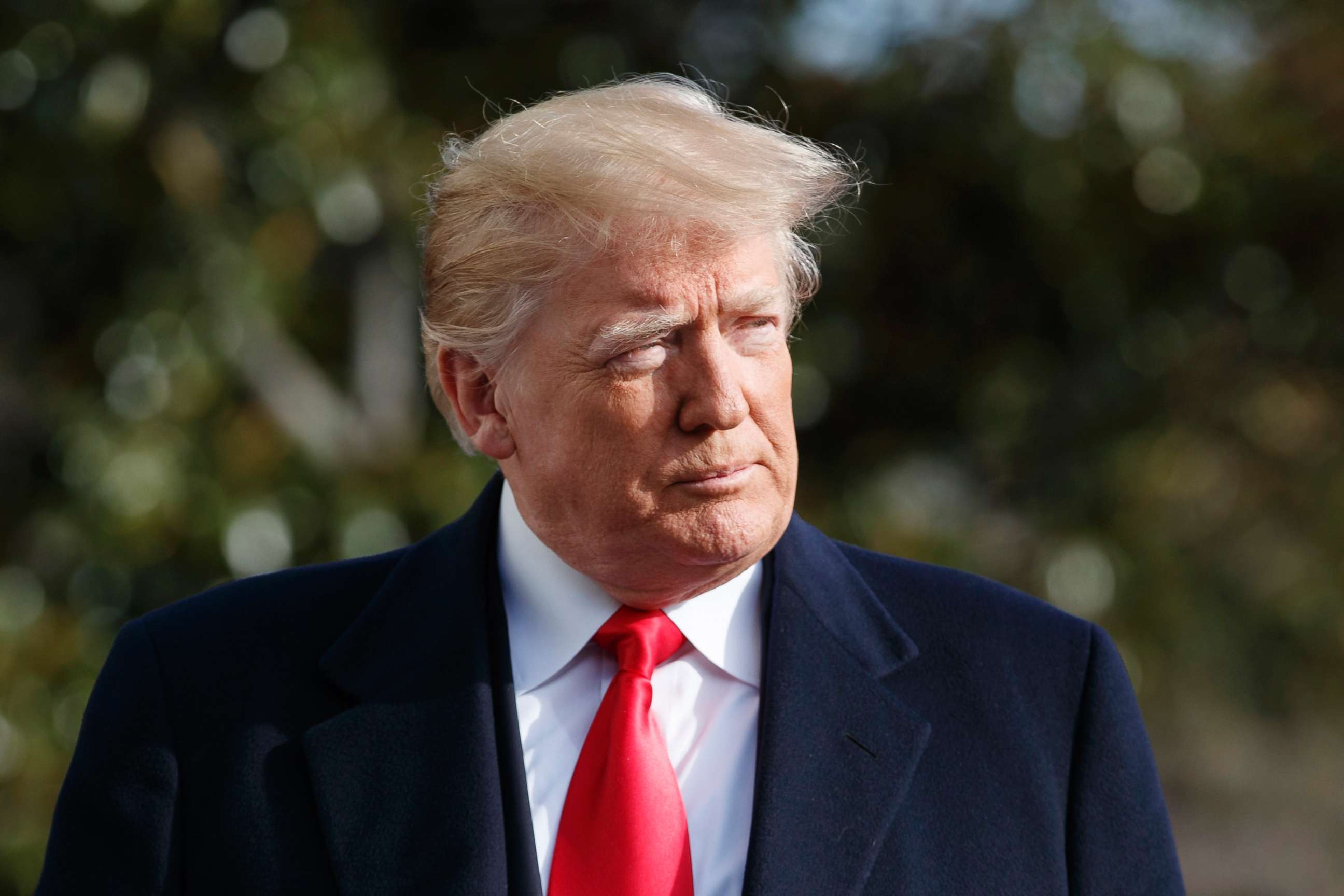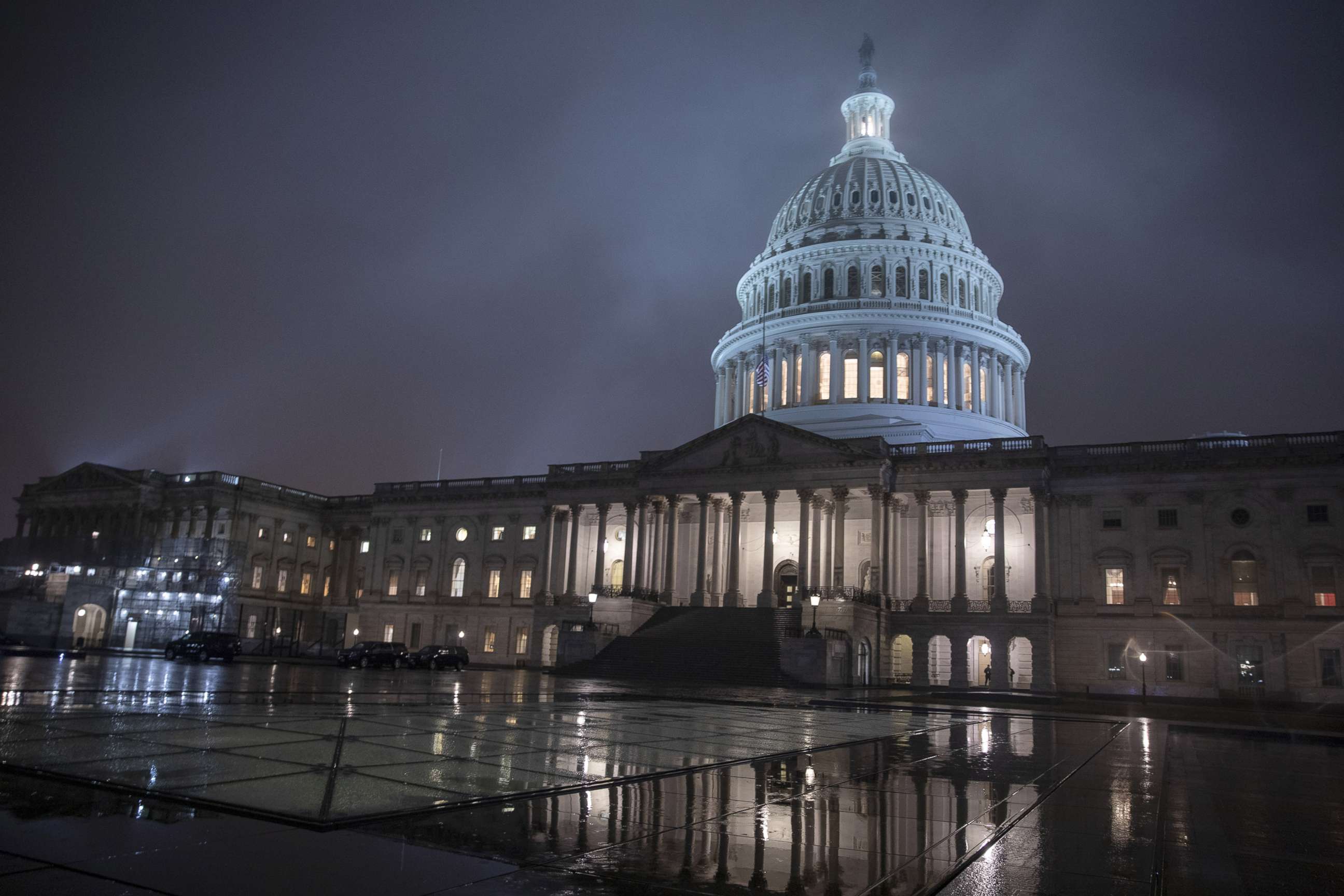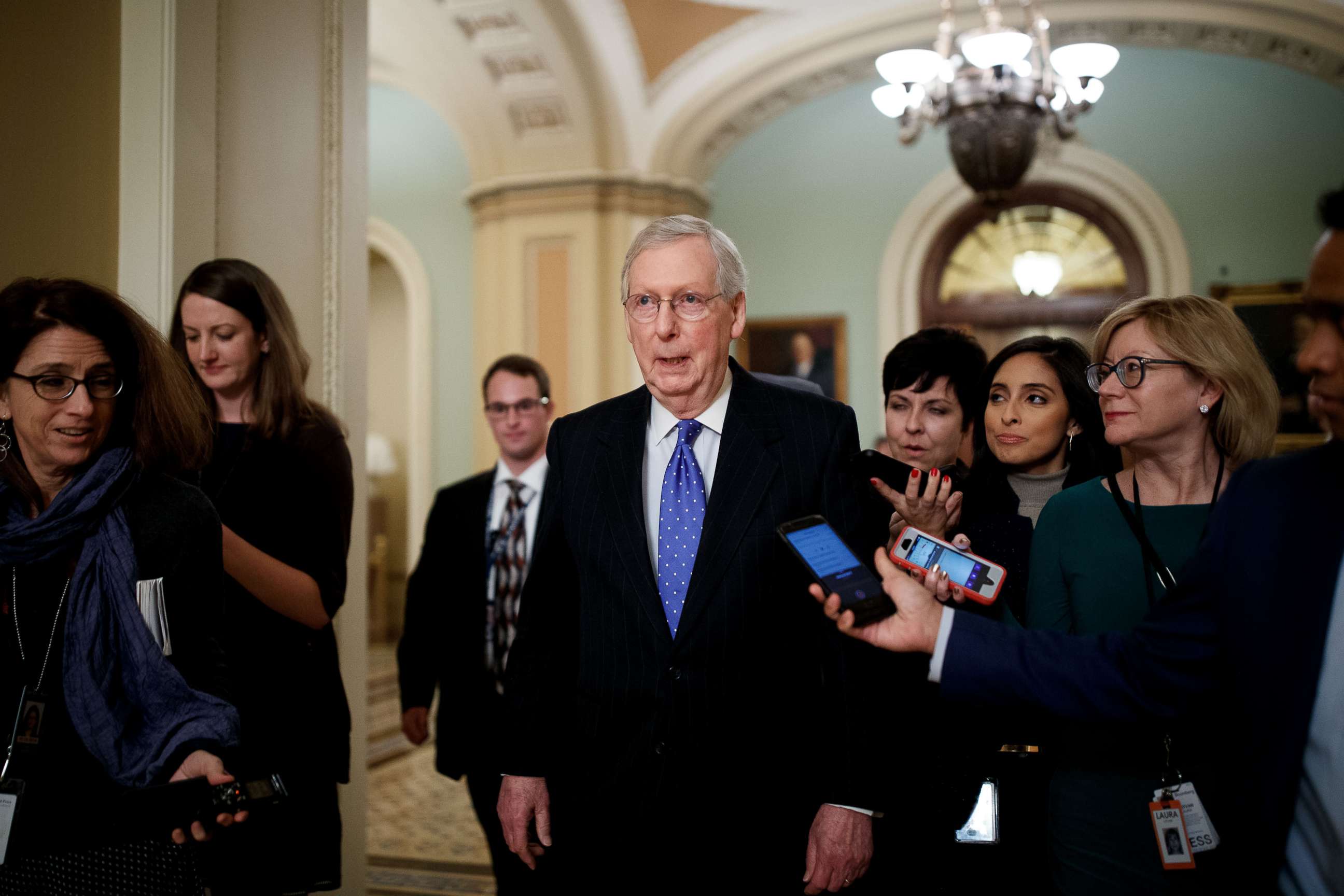Nation heads into the holidays with no immediate hope of an end to the gov't shutdown
Trump has said he won't sign a government funding bill without wall money.
A partial shutdown of the government officially went into effect at 12:01 a.m. Saturday morning as the House and Senate adjourned on Saturday with negotiations stalled between the White House and congressional leaders over border wall funding.
By Saturday evening, lawmakers announced that no further talks were planned until Thursday -- meaning that nearly a quarter of the federal government will likely remain shuttered at least through much of the holiday week ahead.
Late Friday, President Donald Trump tweeted a video at the 11th hour -- of himself speaking to the importance of border security.
"We don't want people coming in that aren't supposed to be here," he said in the video. "The only thing that is going to stop that is great border security. With a wall or a slat fence or whatever you want to call it. But we need a great barrier and if we don't have it, it's never going to work."
"We're going to have a shutdown," Trump continued in the video message. "There's nothing we can do about that because we need the Democrats to give us their votes. ... The shutdown, hopefully, will not last long."
With the help of a tie-breaking vote from Vice President Mike Pence Senate, the Senate advanced a House measure on Friday to fund the government and allocate $5.7 billion in border wall funding. But the bill lacked enough support to clear the 60-vote threshold for passage and put it on President Donald Trump's desk.
"I hope Senate Democrats will work with the White House on an agreement that can pass both houses of Congress and receive the president's signature," Senate Majority Leader Mitch McConnell, R-Ky., said from the Senate floor after the Friday evening vote. "So, colleagues, when an agreement is reached, it will receive a vote here on the Senate floor."
Senate Minority Leader Chuck Schumer acknowledged an appetite for continued discussions, but said there is no path forward for the House bill that funds Trump's desired border wall between the United States and Mexico.
A handful of government agencies not previously funded -- including the Justice Department, State Department and Department of Homeland Security -- will be shuttered by the funding lapse, a situation that could worsen if the shutdown extends beyond the weekend.

Congress appeared on the verge of avoiding a shutdown until Thursday, when the president -- under fire from conservatives lawmakers and media who accused him of abandoning his signature campaign promise -- vowed not to sign a bipartisan, Senate-passed government-funding measure that did not include billions in border wall funding.
"Let’s face it, I mean we have two talk radio show hosts who basically influenced the president and we’re in shutdown mode, it’s just, I mean, that’s tyranny," Sen. Bob Corker, R-Tenn., said Friday afternoon.
House GOP leaders, following the president's lead, quickly added $5.7 billion to the package, and sent it back to the Senate in a Thursday evening vote.
After pledging to take responsibility for a shutdown over border security in an Oval Office leaders last week, Trump on Friday attempted to shift the blame to Democrats, tweeting "The Democrats now own the shutdown!"
“It's up to the Democrats as to whether or not we have a shutdown tonight,” Trump said at a bill signing ceremony in the Oval Office. “I hope we don't, but we are totally prepared for a very long shut down.”
The president called for McConnell to use the "nuclear option," which would override Senate rules that require 60 votes to stop a filibuster and instead would allow a vote to proceed and a measure to pass with just 51 votes or a simple majority.
On Friday, Trump convened a meeting at the White House where he pushed McConnell and other Republican senators to agree to the dramatic rule change. The Kentucky Republican has repeatedly refused to change the rules and a number of other Republicans objected to the proposal.
The president spoke mostly on the "nuclear option," told lawmakers that a shutdown is "acceptable to him," and that "the wall matters and it will be beautiful when built," according to Sen. Roy Blunt, R-Mo., who was briefed on the meeting.
Without guidance from the president on how to proceed as his $5 billion demand faced certain failure on the Senate floor, Republican leaders kept their vote on the House legislation open for several hours while negotiations continued with the White House and lawmakers returned to Washington.
"We’ve got to get clarity from the president as to what his priorities are and then get some consensus with the minority leader on how to get it done," Sen. Thom Tillis, R-N.C., said Friday afternoon.

Pence broke the tie to close the vote after five hours and 18 minutes.
The vice president, joined by White House senior adviser Jared Kushner and budget director Mick Mulvaney, spent the afternoon and evening on Capitol Hill in discussions with Senate leaders and key House Republicans on a possible agreement. They shuttled between the House and the Senate even as the House adjourned and members were dismissed for the night.
“I think there’s progress," Rep. Mark Meadows, R-N.C., told ABC News after meeting with Pence. "To suggest that a deal is imminent would not be appropriate but I can tell you everybody is looking for a breakthrough and this team is working around the clock to do that.”
Meadows, the leader of the conservative House Freedom Caucus who encouraged Trump to reject the initial deal to fund the government, said the president had been phoning lawmakers from the White House throughout the day as negotiations continued.
While conservatives have rejected the possibility of supporting a funding measure with $1.6 billion in border security funding -- the figure previously approved in the bipartisan Senate bill -- Meadows suggested that they and Trump would be willing to accept a deal with less than $5 billion in wall funding, if other conservative border security and immigration provisions were included.
Republicans have also taken issue with restrictions placed on border security funds, as Democrats have sought to prevent the administration from constructing a new border wall with money approved by Congress.

"We need some flexibility there," House Majority Leader Kevin McCarthy told reporters. "The more flexibility there, the dollars you spend go further."
Democrats and Republicans were frustrated by the impasse Friday, even as leaders worked to find a possible solution.
"A government shutdown should be thought of the way you think of chemical warfare and real warfare," Sen. Lamar Alexander, R-Tenn., said. "It should never even be considered. It’s an admission of failure by negotiators."
Earlier in the day, McConnell walked back to his office from the floor while the Senate waited for other members to travel back to Washington and flashed reporters a pin that read "Senate Cranky Coalition."
"This is the unanimous position of our conference," he joked.
Congress has already funded about 75 percent of the federal government, but a partial government lapse could impact hundreds of thousands of federal employees.
Before adjourning on Friday, the Senate passed a measure to ensure that federal employees impacted by the shutdown get paid retroactively; the House could unanimously adopt that measure as early as Saturday afternoon.




